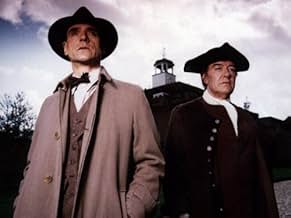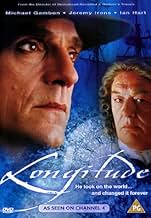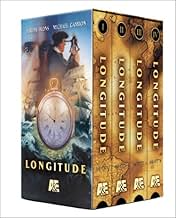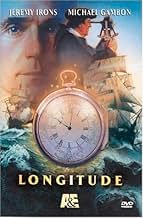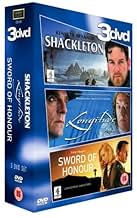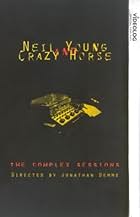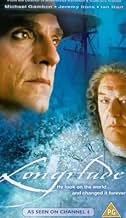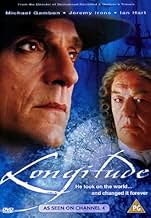Longitude
- टीवी मिनी सीरीज़
- 2000
- 1 घं 39 मि
अपनी भाषा में प्लॉट जोड़ेंIn two parallel stories, the clockmaker John Harrison builds the marine chronometer for safe navigation at sea in the 18th Century and the horologist Rupert Gould becomes obsessed with resto... सभी पढ़ेंIn two parallel stories, the clockmaker John Harrison builds the marine chronometer for safe navigation at sea in the 18th Century and the horologist Rupert Gould becomes obsessed with restoring it in the 20th Century.In two parallel stories, the clockmaker John Harrison builds the marine chronometer for safe navigation at sea in the 18th Century and the horologist Rupert Gould becomes obsessed with restoring it in the 20th Century.
- 5 BAFTA अवार्ड जीते गए
- 7 जीत और कुल 5 नामांकन
फ़ीचर्ड समीक्षाएं
Logitude is another in a long line of excellent British films that have not received the viewership they deserve. I watched this film on Channel 4 shortly after the new year. And I admit, all the hype over this film in the previous weeks was justified. Accute performances on Gambon's John Harrison as well as Iron's part, of whom mind I must admit I am no fan, plus the usual assortment of marvelous west end stage performers in particular John Wood as Edmund Halley proclaim Longitude as excellent entertainment.
The story was, on the other hand somewhat mellowed down and excessively lengthed. Yet I suppose in order to transpire the scientific details presented in the novel, length was required. But overall it is a great recount of history and I strongly recommend it to American audiences who won't find this sort of thing at home easily.
"Longitude" is filled with tons of edge-of-your-seat, gritty scenes, and every second of the 200-minute film glows with a profound message. The ending scene is especially powerful, in which Rupert Gould remarks, "What makes a man great? A man may be great in his aims, or in his achievements, or in both...but I think that man is truly great who makes the world his debtor..who does something for the world which the world needs, and which nobody before him has done or known how to do."
Definitely a great educational film to watch, and an excellent film to own. "Longitude" is an unforgettable experience and a demonstration of just how good a movie can be.
We didn't leave that kitchen for the 3 nights the series was on and merrily sorted out the after-dinner mess,all the while conversing on how to build IT.Anecdote: on the last night my eldest aughter who was 7 came into the kitchen to see what we were watching,and at that age, was captivated. It is also a great tribute to the ethics of learning and wanting,working to achieve something. Sorry if I sounded a bit Victorian in that sense.(Am not). Please watch and recommend this.
The story flip flops back and forth between the life of a shell shocked (literally) 20th century academic and the tale of an 18th century clockmaker, John Harrison, obsessed with winning the Prize of Queen Anne for calculating longitude.
The surprising part is that the two loosely related plot lines work so well together, despite frequent and rapid cuts back and forth. This is a tribute to the great acting skills of the cast, including Jeremy Irons as the 20th century academic. At times, you have to wonder what the heck Iron's struggles with sanity have to do with the 18th century story, but it all seems to quietly tie together in the end.
Harrison knows that if he can develop an accurate watch, solving longitude was a breeze. This may seem academic, but the lives of British seamen were literally at stake. Developing an accurate timepiece was a far more difficult task than we can today imagine, and Harrison faced a skeptical board of theoreticians who preferred more complex scientific solutions than they thought could be provided by a humble clockmaker. The board utterly fails to grasp that the simple solution is the product of a profoundly complex and innovative device.
We think so highly of the great technological achievements of our times, and they are great. We need to be reminded from time to time, as this film does so well, that the breakthroughs of other generations were in there time quite profound. Moreover, we would not be where we are today without them. As the great Sir Issac Newton once said, "If I have seen further, it is because I have stood on the backs of giants".
In the days when ships measured themselves by yardage of sail and bank of cannon, knowing your north-south latitude was easy. Finding your east-west longitude however (and keeping your ship off the reefs) was hit-and-miss. That could get you killed. The cure was to know the time in London, precisely, but keeping time accurate on a rolling ship was tougher than keeping milk fresh; pendulum clocks need stable ground, and pendulum clocks were all they had.
Queen Anne (Br., 1665-1714) had another idea: a 20,000 pound-sterling prize to anyone who had a solution. Problem was, no one expected a country carpenter cum-clockmaker to do it. John Harrison (Michael Gambon) was that carpenter, and it became *his* problem--a three-decades-long problem. It would also pose one for Rupert Gould (Jeremy Irons) two centuries later, as a marriage-busting, sanity-breaking obsession over restoring Harrison's neglected prototypes: clocks that could keep time at sea better than the quartz-timed digital you might be wearing now.
"Longitude" weaves seamlessly--almost--between the two eras, tracking the exertions and miseries of John Harrison and Rupert Gould with the same kind of synchronicity Harrison spent half his life pitching to astronomers who had scarce respect for the tinkerings of a hayseed. Michael Gambon's passionate performance as John Harrison is truly Oscar-calibre, eclipsing Irons--but only because the tunnel-visioned Rupert Gould is hardly a vehicle for the memorable. Too bad this was "only" a TV mini-series. As a theatrical release it would have lent due reknown to a scarce-remembered true epic of genius.
Watch this when you get the chance. Then go punch Tom Green in the nose.
क्या आपको पता है
- ट्रिवियाTo portray the aftermath of the shipwreck in the Isles of Scilly, dozens of extras had to lie in the cold surf, pretending to be dead, for over an hour.
- गूफ़During the entire movie, when H1 is seen, the ticking that can be heard belongs to H3. The actual H1 and H2 tick in a rather dull way, but H3 is instantly recognizable, which is probably why its sound was used for H1 and H2 too. H4 appears to use the correct sound.
- भाव
Sir Edmund Halley: Don't touch that, boy!
William Harrison: I didn't, sir, honest, I was just looking.
Sir Edmund Halley: Do you know what that is?
William Harrison: To tell the movements of the stars.
Sir Edmund Halley: How do you know that?
William Harrison: It's my job at home.
Sir Edmund Halley: You have one of these at home!?
William Harrison: No, sir, we use Mr. Johnson next door's chimney.
Sir Edmund Halley: And, pray, what is it that you learn from Mr. Johnson next door's chimney?
William Harrison: The time.
Sir Edmund Halley: How can you tell the time with a chimney?
William Harrison: If you stand in the right place, you can see Sirius.
Sir Edmund Halley: Sirius?
William Harrison: It moves behind Mr. Johnso's chimney 3 minutes and 56 seconds earlier every day. We need the time for our timepiece, to tell if it's true.
Sir Edmund Halley: And is it?
William Harrison: It's bloody perfect, sir.
- कनेक्शनReferenced in 500 Days of Summer (2009)
टॉप पसंद
विवरण
- चलने की अवधि1 घंटा 39 मिनट
- रंग
- ध्वनि मिश्रण
- पक्ष अनुपात
- 1.78 : 1
इस पेज में योगदान दें


